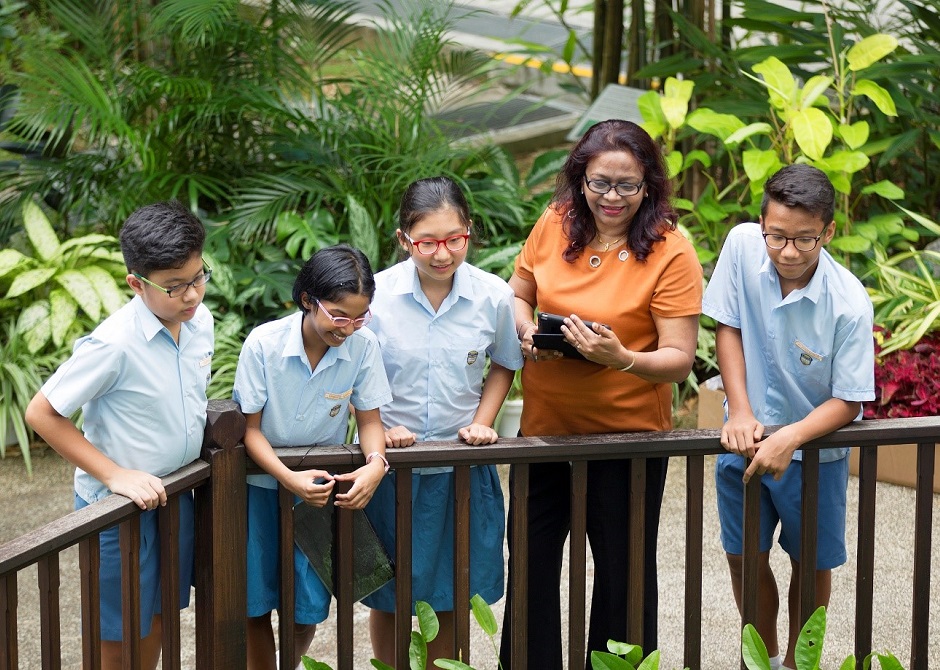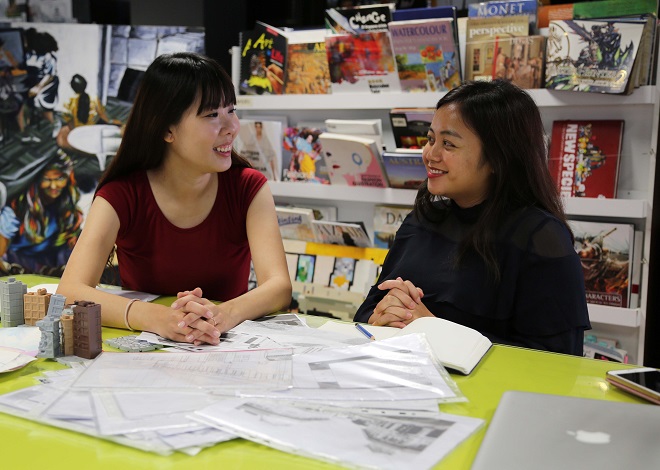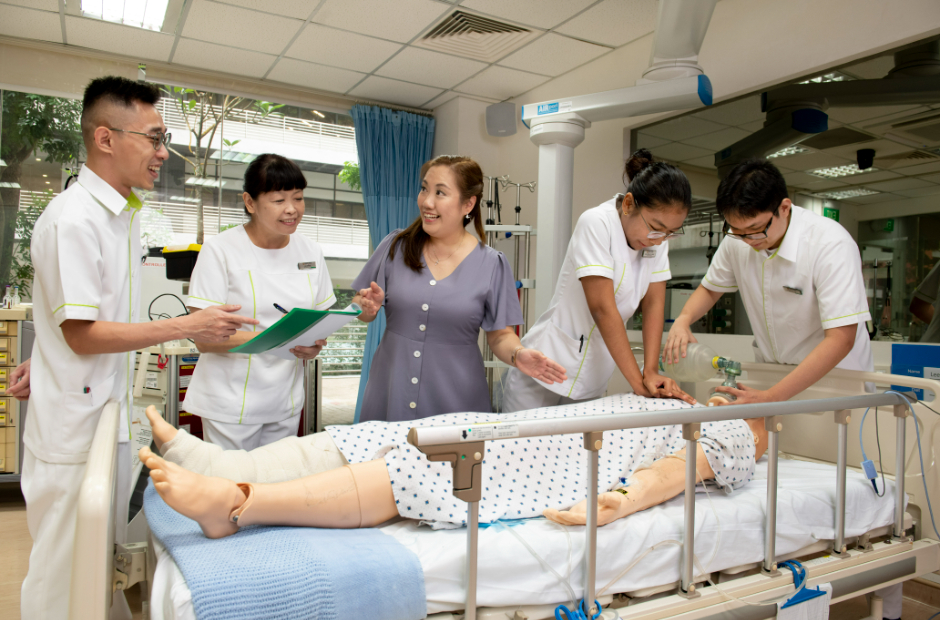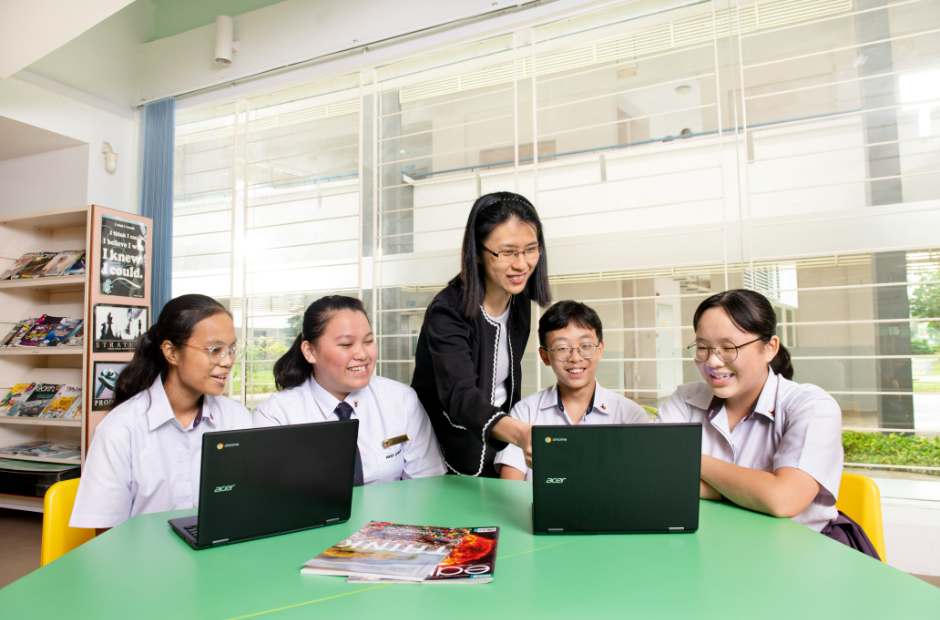Mdm S Nirmala Devi, Guangyang Primary School, President’s Award for Teachers 2018 Recipient
Who is your plumb line?
Lead Teacher (Science) Mdm S Nirmala Devi asks her Primary 6 students this at the end of a lesson.
By that time, they have already learned that plumb lines are strings with weights hung on one end, which engineers and craftsmen use to determine if something is perfectly upright.
But thinking about who serves that function in their own lives, is something else altogether.
Slowly, the children begin to answer. For one, it is her mother. For another, it is the kid who lives next door. Or a best friend. Or a sibling.
This method of teaching — of anchoring a scientific concept into something emotional and relatable, even for young children — is known as affective science. And plumb lines are just one of many concepts which Nirmala has managed to find an emotional hook for.
This teacher of 29 years is always thinking of new ways to engage her students, such as affective science.
So when her Primary 6 classes complete their Primary School Leaving Examination (PSLE), she does not leave them to their own devices. Instead, she turns them into Science ambassadors for their Primary 2 juniors, who will be learning the subject for the first time when they progress to Primary 3.
Each of the older children will take five of their juniors round the school’s garden, pointing out the various plants and getting them excited about learning the subject.
Shortly after Nirmala introduced this initiative, she found it worked so well that she began to think up ways to expose Primary 1 and 2 students to Science throughout the year, instead of its last few weeks.
She found a surprisingly elegant answer in the big picture books they read in their English lessons.
For the Primary 1 book “Short, Tall, Big or Small” on animals, she created a worksheet for students to classify them according to their similarities. For the Primary 2 book “A butterfly is born”, she created another asking students to identify the different stages in the life cycle of a butterfly.
“The purpose is for them to learn to observe. Observation is an important part of Science,” she explains.
Then, she shared the worksheets with her colleagues teaching Primary 1 and 2 as the sheets were easy enough to use. “I’m not just teaching my own students. I have the greater responsibility of looking out for the way Science is taught in the school,” she says, pointing to her role as the school’s Lead Teacher (Science).
Asking the right questions
Even as she guides her colleagues and students, she continues to learn herself. “My responsibility is to become a better learner so that I can teach better. I go for training and courses. I make it a point to collaborate so that I can learn.”
A case in point: after attending a course on ORID questioning — a technique using Objective, Reflective, Interpretative and Decisional questions — she and several other Senior and Lead Teachers in the North Zone, adapted it for classroom use. For one year, the group was given two hours every Friday to meet. But the group members felt it was not enough. So, they met up on their own accord for another two years.
At the end of it, they came up with four publications called “The little BIG schools, with lesson plans using ORID questioning for Primary 1 and 2 English and Maths. The massive project was presented nationally and the materials were made available to all schools that wanted to use the systemic process to guide Primary 1 and 2 students into higher levels of thinking, such as how and why.
New school, new experiments
When Nirmala’s family moved from Yishun to Bishan, she chose to transfer to Guangyang Primary School. But she did not do this simply out of convenience and proximity.
“We never really know until we step out [of our comfort zone]. We can change, see things differently, meet new friends. We can learn — so this is the way you’re doing it — for me as a person and as a teacher.”
And she needs to keep on learning — because of her personal philosophy regarding teaching. “If the kids don’t get it, then teach them in a way that they can understand. If we can improve our craft, we can enable all our students to learn better,” she says.
This is something she is familiar with: she recalls a boy with autism and a girl with a problem of absenteeism. She motivated both to learn and they passed their PSLE exams.
“They had things going against them. But I saw something transforming within them. They were finding out what they were good at, and doing that more and growing as a person.”
“So many children have such low self-esteem, it is important to encourage them when they take small steps,” she remarks.
As Lead Teacher, she also runs workshops for teachers and guides her colleagues. She says, “Now I have a good balance between helping teachers and teaching. Also, I know what to tell the teachers because of my experience with the students. I’m very passionate about impacting teachers but I’m a teacher at the core.”
“Mrs Sam shows how Science is useful in the real world. She makes lessons more interesting by letting us ask questions and be curious.” – Sandhya Suresh, Primary 6






